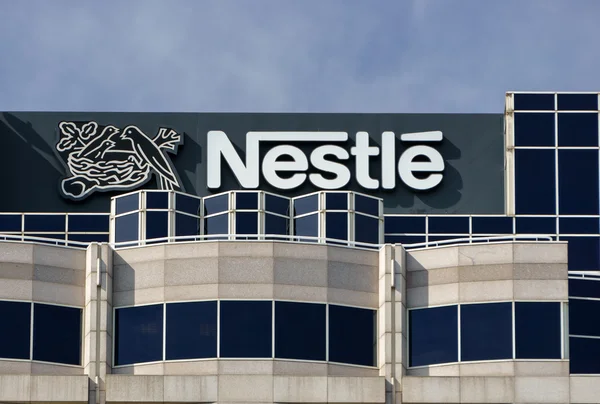Introduction for Nestle India Company –
Nestle India is a subsidiary of Nestle SA, a Swiss multinational food and beverage company. Nestle India has been operating in India for over 100 years and has a diverse product portfolio that includes popular brands such as Maggi, Nescafe, KitKat, and Nestle Pure Life. The company has a strong presence in the Indian market, with a wide distribution network covering urban and rural areas across the country.
Nestle India is committed to sustainable business practices and invests heavily in research and development to innovate new products and improve existing ones. The company has also implemented various sustainability initiatives to reduce its environmental impact and promote sustainable practices. Nestle India is a major player in the Indian food and beverage industry and is known for its high-quality products and strong brand portfolio.
What is the business model of Nestle company?
Nestle is a multinational food and beverage company with a diverse range of products and services. Its business model involves several key elements, including:
- Consumer-centric focus: Nestle’s business model is centered around meeting the needs and preferences of its consumers. The company invests heavily in research and development to create innovative products that cater to the changing tastes and preferences of consumers.
- Diversified portfolio: Nestle has a diversified portfolio of products and services across various categories, including coffee, pet care, infant nutrition, confectionery, and bottled water. This diversification helps the company to mitigate risks and maintain consistent growth.
- Global presence: Nestle operates in more than 190 countries around the world, giving it a strong global presence. This enables the company to leverage economies of scale, reduce costs, and enter new markets with ease.
- Strategic partnerships and acquisitions: Nestle has a history of forming strategic partnerships and making acquisitions to strengthen its portfolio and expand its reach. For example, in recent years, the company has acquired businesses such as Blue Bottle Coffee, Sweet Earth Foods, and Atrium Innovations.
- Sustainability: Nestle is committed to sustainability and has set ambitious targets to reduce its environmental footprint, improve the welfare of animals in its supply chain, and improve the livelihoods of farmers who supply its raw materials.
Overall, Nestle’s business model is centered around delivering value to its consumers through a diversified portfolio of products and services, while maintaining a strong global presence and commitment to sustainability.
How did Nestle become successful in India?
Nestle is a multinational food and beverage company that has been successful in India for several decades. The company’s success in India can be attributed to several factors, including:
- Understanding local tastes and preferences: Nestle has invested in market research to understand local tastes and preferences, and has adapted its products accordingly. For example, Nestle’s Maggi noodles have become a household name in India due to its ability to cater to the Indian palate by offering a range of flavors and spice levels.
- Building strong distribution networks: Nestle has built a strong distribution network in India that reaches even the most remote areas. This has enabled the company to reach a large customer base and increase its market share.
- Investing in local manufacturing: Nestle has invested heavily in local manufacturing in India, which has helped the company to reduce costs and increase efficiency. Nestle has also sourced raw materials locally, which has helped to build strong relationships with local farmers and suppliers.
- Brand recognition: Nestle is a well-known and trusted brand in India, which has helped the company to build a loyal customer base. The company has also invested in marketing campaigns to promote its products and build brand recognition.
- Corporate social responsibility: Nestle has demonstrated a strong commitment to corporate social responsibility in India by supporting local communities, investing in sustainable practices, and promoting education and nutrition.
Overall, Nestle’s success in India can be attributed to its ability to understand local tastes and preferences, build strong distribution networks, invest in local manufacturing, build brand recognition, and demonstrate a strong commitment to corporate social responsibility.
What are the achievements of Nestle India?
Nestle India has achieved several significant milestones and accomplishments over the years. Some of the key achievements of Nestle India are:
- Strong market position: Nestle India is one of the leading players in the Indian food and beverage industry, with a strong market position across various categories, including instant noodles, coffee, milk products, and chocolate.
- Popular brands: Nestle India has a diverse portfolio of popular brands that are well-known and trusted by consumers in India. Some of the popular brands of Nestle India include Maggi noodles, Nescafe coffee, KitKat chocolate, and Nestle Milk.
- Awards and recognition: Nestle India has won several awards and recognition for its products, innovation, and sustainability practices. In 2020, Nestle India was ranked among the top 50 companies on the Fortune India 500 list.
- Sustainable practices: Nestle India is committed to sustainable practices and has set several ambitious targets to reduce its environmental impact and promote sustainable agriculture. The company has also received recognition for its sustainable practices, such as being awarded the Golden Peacock Award for Sustainability in 2020.
- Strong corporate social responsibility: Nestle India has demonstrated a strong commitment to corporate social responsibility and has implemented several initiatives to support local communities, promote education and nutrition, and reduce plastic waste.
Overall, Nestle India has achieved a strong market position, developed popular brands, received awards and recognition, implemented sustainable practices, and demonstrated a strong commitment to corporate social responsibility.
What is the business strategy of Nestle company?
Nestle is a multinational food and beverage company with a diverse range of products and services. The company’s business strategy involves several key elements, including:
- Consumer-centric focus: Nestle’s business strategy is centered around meeting the needs and preferences of its consumers. The company invests heavily in research and development to create innovative products that cater to the changing tastes and preferences of consumers.
- Diversified portfolio: Nestle has a diversified portfolio of products and services across various categories, including coffee, pet care, infant nutrition, confectionery, and bottled water. This diversification helps the company to mitigate risks and maintain consistent growth.
- Global presence: Nestle operates in more than 190 countries around the world, giving it a strong global presence. This enables the company to leverage economies of scale, reduce costs, and enter new markets with ease.
- Strategic partnerships and acquisitions: Nestle has a history of forming strategic partnerships and making acquisitions to strengthen its portfolio and expand its reach. For example, in recent years, the company has acquired businesses such as Blue Bottle Coffee, Sweet Earth Foods, and Atrium Innovations.
- Innovation: Nestle invests heavily in research and development to create innovative products that cater to the changing tastes and preferences of consumers. The company also focuses on improving the nutritional profile of its products and reducing their environmental impact.
- Sustainability: Nestle is committed to sustainability and has set ambitious targets to reduce its environmental footprint, improve the welfare of animals in its supply chain, and improve the livelihoods of farmers who supply its raw materials.
Overall, Nestle’s business strategy is centered around delivering value to its consumers through a diversified portfolio of products and services, while maintaining a strong global presence, investing in innovation, and demonstrating a strong commitment to sustainability.
What is the most successful product of Nestle?
Nestle is a multinational food and beverage company with a diverse range of products, and it has many successful products that have become household names in various parts of the world. However, one of the most successful products of Nestle is its instant noodle brand, Maggi.
Maggi noodles were first introduced in India in the 1980s and quickly gained popularity due to their convenience and taste. Maggi has since become a household name in India, and the brand has expanded its product portfolio to include a variety of flavors and types of noodles.
Maggi has also gained popularity in other parts of the world, including Southeast Asia, where it is a leading brand of instant noodles. Maggi’s success can be attributed to its ability to adapt to local tastes and preferences while maintaining consistent quality and convenience.
In addition to Maggi noodles, Nestle has many other successful products, including Nescafe coffee, KitKat chocolate, and Nestle Milk, among others. However, Maggi remains one of the most successful and iconic products of Nestle.
What is the financial position of Nestle India?
As of December 31, 2021, Nestle India reported strong financial results, indicating a healthy financial position. Some key financial highlights for Nestle India are:
- Revenue: Nestle India reported net sales of INR 16,589 crore in 2021, an increase of 9.7% compared to the previous year.
- Profitability: Nestle India reported a net profit of INR 3,540 crore in 2021, an increase of 13.4% compared to the previous year.
- Earnings per share (EPS): Nestle India reported an EPS of INR 239.3 in 2021, an increase of 13.4% compared to the previous year.
- Dividend: Nestle India declared a final dividend of INR 61 per share for the year 2021, bringing the total dividend for the year to INR 104 per share.
- Cash flow: Nestle India reported a positive operating cash flow of INR 4,086 crore in 2021, indicating strong cash generation.
Overall, Nestle India’s financial position appears strong, with consistent revenue growth, profitability, and positive cash flows. The company’s dividend payout also indicates a strong commitment to returning value to shareholders.
Who is the BOD & major shareholder of Nestle India?
The Board of Directors of Nestle India consists of the following members as of March 2023:
- Mr. Suresh Narayanan – Chairman and Managing Director
- Ms. Svetlana Boldina – Executive Director ( Finance & Control & CFO)
- Mr. Matthias Christoph Lohner – Executive Director ( Technical)
- Ms. Anjali Bansal – Independent Non Executive Director
- Mr. R.V. Kanoria – Independent Non Executive Director
- Ms. Alpana Parida – Independent Non Executive Director
- Dr. Swati A. Parimal – Independent Non Executive Director
- Mr. P. R. Ramesh – Independent Non Executive Director
(Source: Nestle India official website)
As for major shareholders, according to the latest shareholding pattern as of December 31, 2022, the major shareholders of Nestle India are:
- Nestle S.A. – 62.76%
- Foreign Institutional Investors (FII) – 12.12%
- Domestic Institutional Investors (DII) – 9.06%
- Indian Public – 16.06%
Nestle S.A. is the parent company of Nestle India, holding a majority stake in the company.
What is the history and background of Nestle?
Nestle is a Swiss multinational food and beverage company founded in 1866 by Henri Nestle. The company started as a producer of infant food and gradually expanded its product range to include various food and beverage products. Here’s a brief history and background of Nestle:
- Henri Nestle, a German pharmacist, developed a life-saving infant food in 1867 which became known as Farine Lactee Nestle.
- In 1905, Nestle merged with Anglo-Swiss Milk Company, another Swiss company, to form the Nestle and Anglo-Swiss Milk Company.
- In the early 20th century, Nestle expanded its product line to include chocolate, instant coffee, and other food and beverage products.
- In the 1930s, Nestle began to expand internationally, starting with acquisitions in Latin America and Europe.
- In the post-World War II era, Nestle expanded into Africa, Asia, and the Middle East, establishing a global presence.
- In the 1970s, Nestle diversified into other industries, including cosmetics and pharmaceuticals.
- In the 1980s, Nestle became the largest food company in the world through a series of acquisitions.
- In the 1990s, Nestle continued to expand globally, focusing on emerging markets.
- In recent years, Nestle has focused on health and wellness, innovation, and sustainability, with a goal of becoming the leading nutrition, health, and wellness company.
Today, Nestle is a global company with operations in more than 190 countries and a portfolio of well-known brands such as Nescafe, KitKat, Gerber, Purina, and Nestle Pure Life. The company is committed to providing high-quality, nutritious, and sustainably produced food and beverage products to its consumers around the world.
Who is the biggest competitor of Nestle in India?
Nestle has several competitors in the Indian food and beverage industry, but some of its biggest competitors include:
- Hindustan Unilever: Hindustan Unilever is an Indian subsidiary of the Anglo-Dutch company Unilever. It produces a range of food and beverage products, including tea, coffee, and dairy products, as well as personal care and household products.
- Britannia Industries: Britannia Industries is an Indian company that produces a range of food products, including biscuits, bread, cakes, and dairy products.
- Parle Products: Parle Products is an Indian company that produces a range of biscuits, confectionery, and snacks, including popular brands such as Parle-G and KrackJack.
- ITC Limited: ITC Limited is an Indian conglomerate that produces a range of food and beverage products, including biscuits, snacks, ready-to-eat meals, and packaged foods.
- PepsiCo India: PepsiCo India is a subsidiary of the US-based company PepsiCo. It produces a range of beverages, including soft drinks, juices, and sports drinks, as well as snacks and packaged foods.
These companies are major players in the Indian food and beverage industry and compete with Nestle across various product categories. The competition between these companies is intense, with each one vying for market share and consumer loyalty by investing in innovation, marketing, and sustainability initiatives.
Critical Analysis of Nestle India Company –
Nestle India is a subsidiary of Nestle SA, a Swiss multinational food and beverage company. It has been operating in India for over 100 years and has a diverse product portfolio that includes popular brands such as Maggi, Nescafe, KitKat, and Nestle Pure Life. Here’s a critical analysis of Nestle India company:
Strengths:
- Strong brand portfolio: Nestle India has a strong brand portfolio with a range of well-known and trusted brands in various product categories. This has helped the company build a loyal customer base over the years.
- Strong distribution network: The company has a strong distribution network that covers urban and rural areas across India. This has helped the company to reach a wide customer base and establish a strong presence in the Indian market.
- Innovation and R&D: Nestle India invests heavily in research and development to innovate new products and improve existing ones. This has helped the company to maintain its competitive edge in the market.
- Sustainability initiatives: Nestle India has implemented various sustainability initiatives to reduce its environmental impact and promote sustainable practices. This has helped the company to enhance its brand image and appeal to environmentally conscious consumers.
Weaknesses:
- Dependence on a few product categories: Nestle India is heavily dependent on a few product categories such as instant noodles, coffee, and dairy products. This makes the company vulnerable to market fluctuations and shifts in consumer preferences.
- Regulatory challenges: Nestle India has faced regulatory challenges in the past, particularly with its Maggi brand. The company had to recall the product due to the presence of lead and monosodium glutamate (MSG) in excess of permissible limits. This has damaged the company’s reputation and affected its sales in the Indian market.
- Intense competition: The food and beverage industry in India is highly competitive, with several local and international players vying for market share. This makes it challenging for Nestle India to maintain its market position and profitability.
Opportunities:
- Growing demand for health and wellness products: There is a growing demand for health and wellness products in India, driven by increasing health awareness and changing consumer preferences. Nestle India can capitalize on this trend by introducing new and innovative products in this category.
- Expansion into new product categories: Nestle India can explore opportunities to expand into new product categories to diversify its portfolio and reduce its dependence on a few categories. This can help the company to mitigate risks and increase its market share.
- E-commerce and digitalization: The growth of e-commerce and digitalization in India presents an opportunity for Nestle India to enhance its online presence and reach a wider customer base.
Threats:
- Economic downturn: Any economic downturn or recession can negatively impact consumer spending, which can affect the sales and profitability of Nestle India.
- Changing consumer preferences: Consumer preferences can change rapidly, making it challenging for Nestle India to keep up with the changing demands and preferences of consumers.
- Increasing competition: The food and beverage industry in India is highly competitive, with several established players and new entrants vying for market share. This can make it challenging for Nestle India to maintain its market position and profitability.
Overall, Nestle India has a strong brand portfolio, distribution network, and focus on innovation and sustainability. However, the company faces challenges such as dependence on a few product categories, regulatory challenges, and intense competition. To remain competitive and grow, Nestle India must continue to innovate, diversify its product portfolio, and adapt to changing market trends and consumer preferences.
What was the controversy regarding Nestlé?
Nestlé has also been accused of engaging in unethical and unsustainable practices related to its sourcing of palm oil and cocoa. The company has been accused of contributing to deforestation and the exploitation of workers and communities in palm oil-producing countries, as well as the use of child labor in cocoa production.
More recently, Nestlé has faced criticism for its use of single-use plastics and its impact on the environment. The company has been accused of contributing to the global plastic waste crisis and has faced calls to reduce its use of plastic packaging and improve its recycling efforts.



